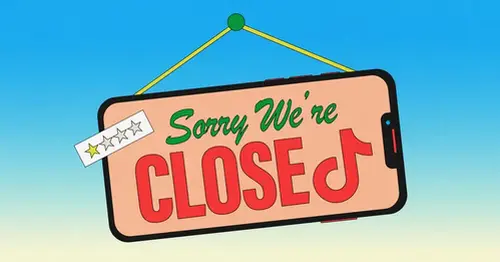
Their small businesses went viral on TikTok for the wrong reasons — now what?
A baker and a tattoo artist recently garnered TikTok virality other small business owners could only dream of. The only problem? The exposure wasn’t positive.
Kylie Allen, owner of the West Virginia-based bakery Kylie’s Kakes, posted a video last month about a dispute with a dissatisfied customer over an $84 rainbow sprinkle cake, which spiraled into a controversy users deemed “cakegate.” Weeks later, a TikTok user by the name of Courtney Monteith’s video about a Canada-based tattoo artist charging high design fees turned into “tattoogate.” Videos about these incidents have racked up millions of views on TikTok, with most people showing support for the customer.
These viral sagas, according to marketing experts, highlight the need for businesses to educate themselves about social media marketing and create policies around platforms and managing customer complaints.
While TikTok has proven to be a powerful tool for small businesses, users on the app can tear businesses down as quickly as they can uplift them, especially when customer complaints — and business owners’ subsequent reactions — go viral. In some instances, such unwanted attention can also result in death threats against the owners, harassment and review bombing.
“As a business, you need to have a policy on how you manage unhappy and dissatisfied customers,” said Angeli Gianchandani, marketing professor at the University of New Haven.
“And, when you identify that and you make good with the consumer, it won’t spiral.”
Sometimes, when it comes to the internet, that may mean refraining from engaging directly with your audience in the wake of sudden backlash.
On TikTok, a user’s video complaint can be picked up by the algorithm and stretched out for days, oftentimes making it difficult for business owners to manage the backlash. Positive testimonials can get drowned out by one negative review with just one viral post.
Sometimes, the business owners inadvertently shine the spotlight on their wrongdoings themselves.
“You might just let it play out, unfortunate as that might be,” said Josh Rosenberg, CEO of Day One Agency, which focuses on digital marketing, public relations and social media.
You might just let it play out, unfortunate as that might be.
-Josh Rosenberg, CEO of Day One Agency, a marketing agency
This doesn’t mean an owner should ignore the feedback. Rather, they should try their best to resolve the customer’s issue privately, and if the criticism continues, it may be best to disengage.
In Allen’s video, which received over 9 million views, she said her customer “got super defensive and very rude about the price of the cake, although this is exactly how we decorate all of our rainbow cakes.” The customer responded with a video showing the cake, which she said was low quality for the price.
Many viewers agreed with the customer, which led to discourse over whether Allen was in the wrong for her criticism in the first place.
Allen declined a request for comment. In an interview with the “Baking For Business Podcast,” she said that she was “ashamed” with how she handled the situation and “would never make another video” like the one that sparked "Cakegate."
The controversy ultimately did not hurt Kylie’s Kakes financially, Allen said, because the people weighing in online were not her target customer base in West Virginia.
Still, Rosenberg said, “in business, you should always take the high road.”
“If you are running a small business, you do need to really build those true authentic relationships with your customers and talking negatively about them probably isn’t the best approach,” he said.
Ultimately, the best thing business owners can do is focus on “creating a product worth advocating for,” Rosenberg said.
Meanwhile, "tattoogate" demonstrated why entrepreneurs should be utilizing social media to partake in the online conversation about their businesses, according to Emma Ferrara, chief business development officer at marketing agency Viral Nation.
“The beauty of social is that people want to get that behind-the-scenes access,” said Ferrara. “They want to be a part of the journey. But with that, I think it’s important to understand that your social platform is there to really help to maintain your company’s reputation.”
Monteith, whose first video complaining about her tattoo experience garnered over 5 million views, said she paid $180 for a consultation with an artist whom she didn’t name. She said she also paid $1,000 for a deposit and $1,500 design fee, an additional charge that other artists say is unconventional in the tattooing industry.
Monteith, who did not immediately respond to a request for comment, said she ended up not getting the tattoo — but was out over $2,600.
Many users who rallied behind Monteith quickly discovered the name of the artist, who was not on TikTok, as well as the business’ name. The artist did not respond to a request for comment.
Ferrara said getting on social platforms like TikTok “could also be an opportunity to be really clear about your services and what you charge for and what you don’t, so you don’t have any misunderstandings or anything that’s unclear.”
However, she said, owners should create guidelines for how to conduct themselves online when posting from their business pages.
“Can you perhaps build yourself kind of a do’s and don’ts policy list for yourself?” Ferrera said. “So when you’re posting these things, or when you’re creating your content strategy, it’s something that you can reference and go back to.”
Ferrara added that business owners should maintain the same level of customer service online as they would offline.






